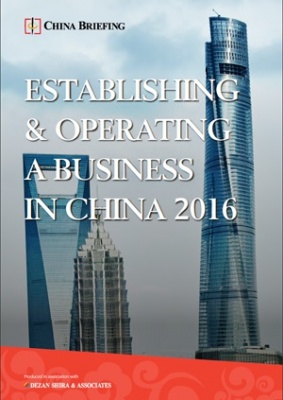
Establishing & Operating a Business in China 2016
Published: April 2016Establishing & Operating a Business in China 2016, produced in collaboration with the experts at Dezan Shira & Associates, explores the establishment procedures and related considerations of the Representative Office (RO), and two types of Limited Liability Companies: the Wholly Foreign-owned Enterprise (WFOE) and the Sino-foreign Joint Venture (JV). The guide also includes issues specific to Hong Kong and Singapore holding companies, and details how foreign investors can close a foreign-invested enterprise smoothly in China.
This publication has now been updated. Please click here to access the latest edition.
No. of Pages: 100 pages
ISBN: 978-988-14804-6-0
Establishing & Operating a Business in China 2016, produced in collaboration with the experts at Dezan Shira & Associates, explores the establishment procedures and related considerations of the Representative Office (RO), and two types of Limited Liability Companies: the Wholly Foreign-owned Enterprise (WFOE) and the Sino-foreign Joint Venture (JV). The guide also includes issues specific to Hong Kong and Singapore holding companies, and details how foreign investors can close a foreign-invested enterprise smoothly in China.
One of the first choices a foreign investor coming to China faces is what type of entity to set up– or indeed, whether to set one up at all. Foreign investment into China can be made via one of several types of foreign-invested entities (FIEs). Choosing the appropriate investment structure for your business depends on a number of factors, including its planned activities, industry, and investment size.
We discuss the features of a Chinese business license, establishing a company in the Free Trade Zones, offshore holding companies, and issues specific to Sino-foreign joint ventures. We also cover the procedure of opening a bank account in China, intellectual property considerations and key positions in a foreign-invested entity. Finally, we walk investors through the complicated audit procedures during the closing down of a foreign business in China.
- Opening a bank account
- Intellectual Property considerations
- Foreign currency controls and profit repatriation
- Corporate seals
- Key positions in a Foreign-invested Entity
- Articles of association
- Establishing a branch
- Human Resources
- Taxes
- Changing a Business Scope
- Selling to China
- Pre-investment Considerations
- Representative Office or Foreign-invested Entity
- Foreign-invested Entities: WFOEs and JVs
- Business license and business scope
- Registered capital
- Foreign-invested Partnerships
- Expense and Tax Planning
- Establishing a company in the Free Trade Zones
- Set-up Procedures
- Representative Office
- Wholly Foreign-invested Enterprise
- Issues specific to Sino-foreign Joint Ventures (JVs)
- Offshore holding companies
- Hong Kong and Singapore holding companies
- Changes to a Business and Closure
- Changes to a business
- Closing a Foreign-invested Enterprise
- Closing a Representative Office
- Audit Procedures

